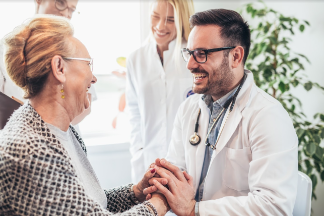As more and more people become vaccinated, you might be wondering what guidelines to follow. Who are you allowed to visit? How effective is the vaccine? What are side effects I might experience? Is there a chance I could still get COVID-19? We’ve taken some of your most asked questions and laid out all the facts for you.
Do I have to wear a mask after getting the COVID-19 vaccine?
Even after you get vaccinated, you should continue wearing a mask. The first reason for this is because the vaccines that are currently approved for emergency use by the FDA require two doses given 3-4 weeks apart. Your body needs this time to build an immune response.
Another reason is that no vaccine is 100% effective at preventing COVID-19. People who get the vaccine are much less likely to get the disease (and if they do, they have a much lower risk of developing severe symptoms), but they can still carry and spread the disease to more vulnerable populations.
Vaccines are just one tool in our toolkit to prevent the spread of COVID-19. It is important that we continue to follow CDC guidelines for the pandemic, even after getting one or both doses of the COVID-19 vaccine. Please remember to wash your hands regularly, always wear face coverings in public, and follow social distancing guidelines and government quarantine directives in your area.
Do I need to wear a mask when visiting family?
If you’ve been fully vaccinated:
- You can gather indoors with fully vaccinated people without wearing a mask.
- You can gather indoors with unvaccinated people from one other household (for example, visiting with relatives who all live together) without masks unless any of those people or anyone they live with has an increased risk for severe illness from COVID-19.
How effective is the COVID-19 vaccine?
Both the Pfizer-BioNTech vaccine and the Moderna vaccine have efficacy rates of about 94%, while the Johnson & Johnson vaccine has an efficacy rate of 66% at preventing symptomatic cases. While it is still possible to develop COVID-19 after receiving the required doses of any of these three vaccines, it is unlikely that you will notice any severe symptoms.
What could be side effects of the vaccine?
Side effects that have been reported with the COVID-19 vaccines include moderate flu-like symptoms (headaches and body aches) along with injection site pain.
There is a remote chance that the COVID-19 vaccines could cause a severe allergic reaction. A severe allergic reaction would usually occur within a few minutes to one hour after getting a dose of the COVID-19 vaccine. For this reason, your vaccination provider may ask you to stay at the place where you received your vaccine for monitoring after vaccination.
The Moderna COVID-19 vaccine is still being studied in clinical trials. For more information about side effects, please see the fact sheet for vaccine recipients.
Can I get COVID-19 if I’ve been vaccinated?
We know that COVID-19 vaccines are effective at preventing COVID-19 disease, especially severe illness and death. We’re still learning how effective the vaccines are against variants of the virus that causes COVID-19. Early data show the vaccines may work against some variants but could be less effective against others.
We know that other prevention steps help stop the spread of COVID-19 and that these steps are still important, even as vaccines are being distributed. We’re still learning how well COVID-19 vaccines keep people from spreading the disease. Early data show that the vaccines may help keep people from spreading COVID-19, but we are learning more as more people get vaccinated. We’re still learning how long COVID-19 vaccines can protect people.
If you or someone you know still needs a COVID-19 vaccine, schedule an appointment with our vaccine site today.




